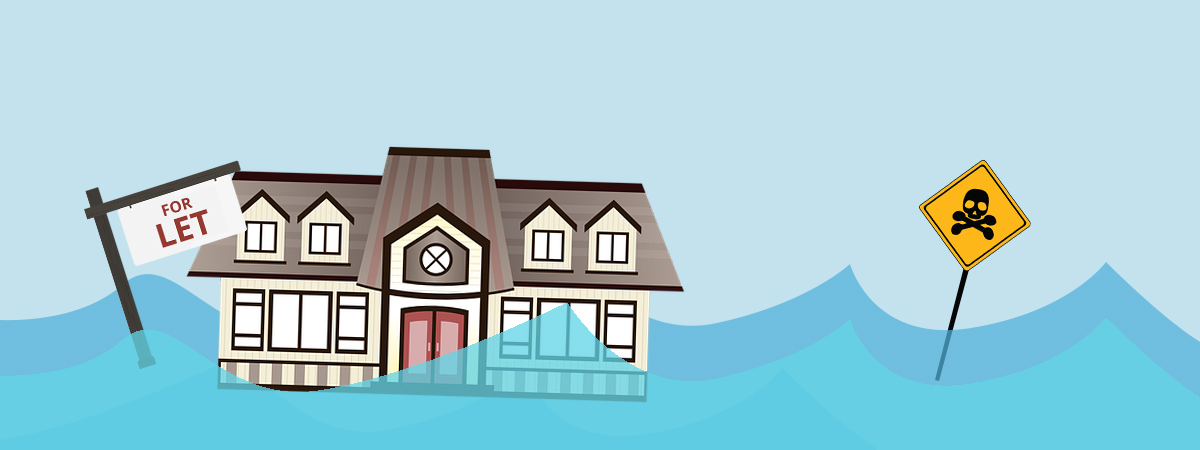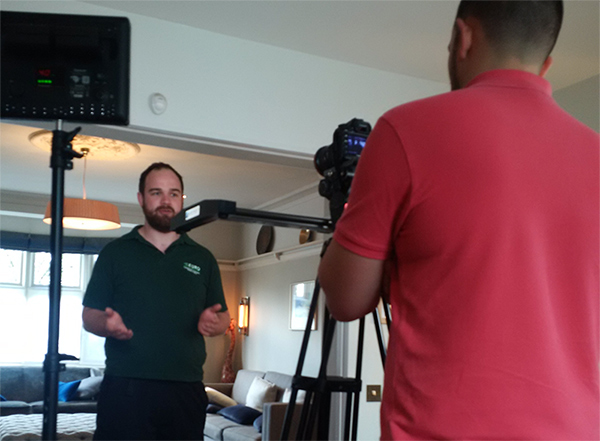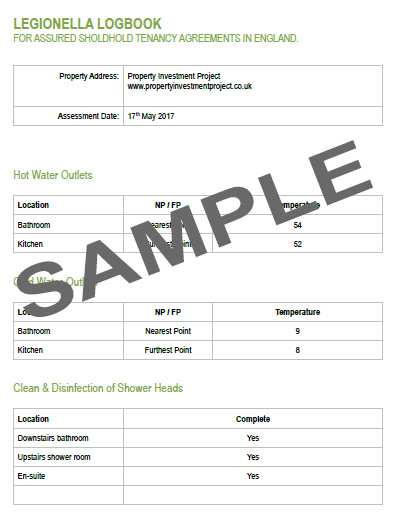
Over the years, I’ve managed to accumulate quite a dusty pile of emails from a rather large group of puzzled landlords, all thirsty for information on the whole landlord Legionella Risk Assessment Legislation, which seems to be a real head-scratcher among the masses.
They’ve heard something about it, but not really sure what, where or how.
If you’re one of the aforementioned head-scratchers, this is probably the blog post for you! The landlord’s guide to the Legionella Risk Assessment Legislation…
Now, if you have no idea what I’m talking about, you’re forgiven, because while the landlord Legionella legislation is a legal obligation and isn’t anything new, there’s definitely an unwritten rule among landlords and letting agent, which stipulates it’s better left untouched, because no one really knows what the fuck it is, or why it even exists. It’s just an odd freak of nature that’s mostly ignored.
It’s so odd that there’s very little guidance on it, and the very little there is is utter dogshit. Even the official HSE website does an embarrassing job; there’s a lot of fluff, but no practical instructions covering what we actually need to do in order to comply. Ironically, when you do actually read the details that are available (after 2 prerequisite shots of espresso), it just seems like a completely pointless legislation (which will quickly become evident as I comb through the details for you).
If I were to hazard a guess, I’d say most landlords don’t comply, whether that be intentionally or unintentionally. Actually, I’ll go one step further and say I’d bet your left nut-sack on the fact it’s the most neglected legal obligation, even by letting agents.
Page contents
- The Landlord Legionella Law
- What you must do to comply
- Landlord Legionella Risk Assessment Video Guide (How to conduct a Legionella Risk Assessment)
- Who can assess the Legionella risk?
- Professional Legionella Risk Assessment Service
- Keeping a record of the assessment
- Reviewing your risk assessment
- Penalty for failing to comply
- Download Landlord Legionella Logbook
The Landlord Legionella Law
Please note, these guidelines apply primarily to landlord’s in England. Other regions are similar but there may be important differences.
You can access a full detailed guide on the legalities on the HSE website; feel free to fill your boots with that luscious drivel. Enjoy.
But over here, where killing you of boredom isn’t always priority number one, I’m just going to smash n’ grab what I consider to be the need-to-knows, with a little extra narration for added spice…
Section 3(2) of the Health and Safety at Work Act 1974 (HSWA) makes provision for relevant health and safety legislation to apply to landlords to ensure a duty of care is shown to their tenants’ with regard to their health and safety.
The Control of Substances Hazardous to Health Regulations 2002 (COSHH) provides a framework of actions to control the risk from a range of hazardous substances, including biological agents (eg Legionella) – to identify and assess the risk, and implement any necessary measures to control any risk.
That all seems pretty straightforward; landlords need to comply with health and safety legislation, which includes the control of Legionella. Got it.
What you must do to comply…
The practical and proportionate application of health and safety law to landlords of domestic rental properties is that whilst there is a duty to assess the risk from exposure to Legionella to ensure the safety of their tenants, this does not require an in-depth, detailed assessment.
Good. No one likes in-depth!
A simple assessment may show that there are no real risks and are being properly managed and no further action is needed. It is important to review the assessment in case anything changes in the system.
For most domestic hot and cold water systems, temperature is the most reliable way of ensuring the risk of exposure to Legionella bacteria is minimised ie keep the hot water hot, cold water cold and keep it moving. Other simple control measures to help control the risk of exposure to Legionella include:
- flushing out the system prior to letting the property
- avoiding debris getting into the system (eg ensure the cold water tanks, where fitted, have a tight fitting lid)
- setting control parameters (eg setting the temperature of the hot water cylinder (calorifier) to ensure water is stored at 60°C)
- make sure any redundant pipework identified is removed.
The risk is further lowered where instantaneous water heaters (for example combi boilers and electric showers) are installed because there is no water storage.
I mean, that sounds good and all… but, that’s not really useful guidance on ‘what to do’. What does “flushing out the system” actually mean?
Unfortunately that’s as far as the guidance goes, and that’s precisely why I decided to get off my rotund ass and actually do something about it. Not without help, mind you. I ain’t that useful.
Do you know what makes it even more confusing? I’ve shuffled through various other articles published by reputable landlord websites to see what they have to say on the matter, and I’ve been scratching my dizzy head ever since. They make the assessments seem ridiculously complicated, and they recommend checking shit that isn’t even covered in the official HSE website. So I wonder where they are actually getting their information from! It seems like they want you to go above and beyond just for ‘good practise’. I want no part of that, so I’m going to stick by the HSE guidelines.
Landlord Legionella Risk Assessment Video Guide (How to conduct a Legionella Risk Assessment)
I’ve been wanting to throw this video together for donkeys, but I didn’t have the contacts. Eventually, I struck up a deal with Upad; their end of the deal was to hook me up with an expert in disease-ridden H20 who was willing to prance around in front of the camera, while in return, I have to ‘service’ one of their longest-serving employees, Helga, who has had a hard and slow dating career.
I hope you appreciate the hit I’m taking for you guys. But man, Upad really do take care of their staff.
So, the following Legionella video guide is a collaboration of my brain child (stemmed by the thought of thousands of landlords not understanding the legislation, which caused me many sleepless nights), Upad’s swanky… err Pad, and the Legionella experts, Euro Environmental.
Please note, this video is for guidance purposes only, and does not constitute legal advice. You should always seek professional advice to ensure you meet your landlord obligations.
Logbook
A template logbook is available to download below.
Thermometer
The assessor said any standard digital thermometer will suffice to take the temp, including cooking probes, which are often shoved into poultry. I found this reasonably priced one on Amazon (which actually looks quite similar to the one in the video), but there are tonnes to choose from…
Minimising risk
From my interpretation, you just need to make sure there is a minimised risk of Legionella, which generally entails:
- Ensure the main water source outlet pipe reaches above 50 degrees.
- Flush the hot water cylinder (calorifier) on an annual basis
- Ensure the closest and furthest cold/hot water outlets meet the right temperatures. Hot water should reach above 50 degrees, the cold should reach below 20 degrees, both with in 1 minute of turning on the tap.
- Disinfect the showerhead and hose with regular domestic disinfect.
If the required temperatures aren’t achieved, you can try adjusting the settings until they do. Failing that, you may want to contact a gas safe registered engineer to assist in hitting those targets.
So there you have it. That’s how landlords comply according to Euro Environmental! Or at least, for that very typical property setup.
Is that any clearer for you? Sweet.
Who can assess the Legionella risk?
Ok, so the variating answers to this question is what actually spurred me into getting the video created (along with the total lack of practical guidelines).
For those agents that don’t avoid direct eye contact with the legislation, many of them are doing exactly what you’d expect them to do- abuse our trust by profiteering from our ignorance. And I fear more will only join the club by paying attention to the legislation but for all the wrong reasons…
A while back I caught a vulgar whiff of some rather unsettling news- apparently a growing number of letting agents are extortionately charging landlords for arranging assessors to conduct the risk assessments, and of course, scaremongering landlords into getting it done.
I have no doubt in my mind that agents have made a nice cherry on top from those assessments, and are continuing to do so, particularly by peddling the shameless lie of needing a qualified assessor to comply, along with grossly exaggerating the intricacy of the process.
I’m sure many of those agents don’t make the following clear…
In most cases, the actions landlords need to take are simple and straightforward so compliance does not need to be burdensome or costly. Most landlords can assess the risk themselves and do not need to be professionally trained or accredited; but if they do not feel competent, or inclined to do so, they can arrange for someone who is to do it on their behalf. Most landlords are able to understand the set of risks of running a hot and cold water system in a way that provides the above conditions; and would also be able to implement cheap, simple and effective physical control measures required to minimise the risk of the system becoming colonised with Legionella and other microorganisms.
Furthermore, Case 357 on the HSE website, highlights how consultants and letting agents have been spreading misinformation on the matter, which has imposed unnecessary financial burdens on landlords where they are being charged for legionella testing and certificates they don’t actually need.
Email from agent to landlord
Here is an email that one of my reader’s received from their agent…
Legionella legal update
Has your property been checked for legionella? You can read more information on landlord’s requirements in the following link:
http://www.hse.gov.uk/legionnaires/legionella-landlords-responsibilities.htm
As your property manager we have taken legal advice, and can confirm that it is a legal requirement that a full risk assessment is carried out. We are able to assist by arranging the following:
Properties that are mains fed without storage tanks – A legionella risk assessment and certified clean & disinfection of ALL showers and shower heads
£95 + VAT
Properties that have storage tanks – A legionella risk assessment, certified clean & disinfection of ALL showers and shower heads, and a certified clean & disinfection of ALL cold water storage tanks
£175 + VAT
Please contact our office should you want to book either of these services.
Please, do not allow an agent to bully you into believing anything other than the following…
- Landlords do NOT need a certificate or some kind of elaborate test!
- You CAN carry out the legionella risk assessment yourself (as long as you’re competent), so you do NOT need an external asshole to assist.
Professional Legionella Risk Assessment Service
If you don’t feel comfortable or qualified to conduct a Legionella Risk Assessment yourself, or if you just can’t be assed with the hassle (I truly emphasise), you can throw money at the problem. You can order an assessment online from LettingAProperty.com.
| Supplier | Notes / Includes | Price | |
|---|---|---|---|
Supplier | Notes / Includes Conducted by a professional inspector, your assessment will identify any risk of legionella bacteria in your property’s water system and highly any measures needed to keep your tenant healthy and property safe.
| Price £119Inc VAT (Normal price: £129) | More Info £10 Discount Code: PIP10 |
Please note, I try my best to keep the information of each service up-to-date, but you should read the T&C's from their website for the most up-to-date and accurate information.
Keeping a record of the assessment
Landlords are not necessarily required to record the findings of the assessment (this is only a statutory duty for employers where there are five or more employees), but they may find it prudent to keep a record of what has been done for their own purposes.
Truly baffling. Even though the video guide recommends logging the readings, you don’t actually need to in order to comply (unless it’s a commercial property, and you’re the employer of 5 or more people). So my question is, how does anyone actually prove/disprove that the legislation has been complied with? Then again, it’s not like the logbook can’t be scammed and back-dated.
This is clearly where the legislation starts to unravel… into a bag of pointless shit.
Reviewing your risk assessment
The law does not prescribe that the risk assessment be reviewed on an annual or biennial basis. It is important to review the assessment periodically in case anything changes but where there are difficulties gaining access to occupied housing units, appropriate checks can be made by carrying out inspections of the water system, for example, when undertaking mandatory visits such as gas safety checks or routine maintenance visits.
Right. So while it’s recommended to do an initial assessment at the beginning of each tenancy, there’s no set period when you need to reassess. Basically, whenever.
Bah. What the fuck is this legislation? Other than a piece of shit, I mean.
Is this really saving lives and/or a shit-storm of bad tummies and diarrhea? If it is, I’m struggling to see how. To clarify, I don’t disagree with the principle of landlord’s minimising the risk of legionella, but I don’t see how the flimsy requirements of the current legislation is actually doing that.
In any case, Landlord Zone recommends to review the risk assessment annually and in the following situations (even though HSE doesn’t say it’s necessary):
- There are changes to the water system or its use.
- There are changes to the use of the building in which the water system is installed.
- New information about risks or control measures becomes available.
- The results of checks indicate that control measures are no longer effective.
- A case of legionellosis associated with the system has been diagnosed.
Penalty for failing to comply…
So while this all seems like a royal waste of time and a total dud, it still is, of course, imperative to comply, because there can be ugly consequences otherwise… err… possibly…
… if a tenant were to contract Legionnaires’ disease from the water system in their home, the landlord may be liable to prosecution under HSWA, and would have to demonstrate to a court that they had fulfilled their legal duty, so it is important that they assess and control the risks.
I tried Googling around for some specific cases where landlords have been prosecuted for failing to comply, but to no avail, which wasn’t terribly surprising. I’m not saying it hasn’t happened, but if Google is struggling to find cases, it might be safe to assume you’re more likely to get hit by lightning than have some wally sue you over contracting legionnaires disease.
Has there ever been a case where such penalties have been dished out to a private landlord? Meh, I don’t know. But I suspect there to be a very limited amount if there has, simply because it seems extremely difficult to point-blame.
I did find this one case though, where a housing association has been fined £12,000 following an outbreak of Legionnaires’ disease at a sheltered housing scheme. However, that’s an entire housing association, but it does prove there are penalties.
While I don’t necessarily see the point in any of this… as always, it’s best to roll over and do as you’re told by the powers that be, no matter how stupid. Sigh.
So, a couple of questions for you…
- Were you aware of the legislation?
- Do you comply with the legislation? If not, are you going to make an effort from now on?
- Have you paid or been bullied by an agent to fork out for an assessor?
Got any questions? Probably not worth asking me on this matter, but I’m sure someone will be able to assist.
Hope this round-up has been useful! xoxo
Thank you
Thanks to Upad for providing the location and hooking me up Euro Environmental, and thank you to Euro Environmental for dropping the knowledge, and last but not least, thank you to my homeboy behind the camera for bringing it to the screen…

Legionella Video Cameraman
Landlord Legionella Logbook
As said, even though the HSE says you don’t need to log your recordings in order to comply, it’s probably a good idea to jot them down to protect yourself from any unsavoury (and evidently unlikely) legal proceedings. So feel free to download the template I threw together, but use at your own sweaty risk :)

If you have already subscribed to my mailing list, just enter the same email address you subscribed with, and you’ll get taken directly to the download page without having to resubscribe!
Disclaimer: I'm just a landlord blogger; I'm 100% not qualified to give legal or financial advice. I'm a doofus. Any information I share is my unqualified opinion, and should never be construed as professional legal or financial advice. You should definitely get advice from a qualified professional for any legal or financial matters. For more information, please read my full disclaimer.


 Landlord Products / Services
Landlord Products / Services









Good article - it is one of the vaguest pieces of legislation out there. I looked into it a few years ago and came to the same conclusions; the penalty for not complying is……if your tenant gets legionnaires disease you might be in trouble. I’m not sure you need legislation to tell you that.
For most properties with a combi boiler I really don’t see where the risk is. I decided to arm myself with a thermometer and do my own assessments, starting with my own house as a trial. My conclusions were that in my house the main area of risk is the spa bath (my wife is semi-aquatic I think) and the advice was to make sure it was flushed out and cleaned with spa bath stuff. So the action is upon the occupier.
So now, as part of my rental pack I include some basic advice (via google) about avoiding Legionella, and carry out a basic check of the house before rental. For a house with a combi and nothing odd like a spa bath the advice seems to consist of descaling things and flushing water through if the property has been left empty for a while.
Another piece of legislation good landlords, likely with low risk properties, will at least have heard of and possibly complied with, but the bad landlords with rubbish manky houses will totally ignore – what is the point?